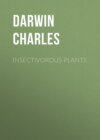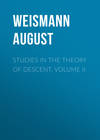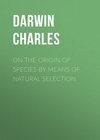Kitabı oku: «Insectivorous Plants», sayfa 13
Lead, Chloride of. – Three leaves were immersed in ninety minims of a solution of one part to 437 of water. After 23 hrs. there was not a trace of inflection; the glands were not blackened, and the leaves did not appear injured. They were then trans- ferred to the solution (1 gr. to 20 oz.) of phosphate of ammonia, and after 24 hrs. two of them were somewhat, the third very little, inflected; and they thus remained for another 24 hrs.
Tin, Chloride of. – Four leaves were immersed in 120 minims of a solution of about one part (all not being dissolved) to 437 of water. After 4 hrs. no effect; after 6 hrs. 30 m. all four leaves had their submarginal tentacles inflected; after 22 hrs. every single tentacle and the blades were closely inflected. The surrounding fluid was now coloured pink. The leaves were washed and transferred to water, but next morning were evidently dead. This chloride is a deadly poison, but acts slowly.
Antimony, Tartrate of. – Three leaves were immersed in ninety minims of a solution of one part to 437 of water. After 8 hrs. 30 m. there was slight inflection; after 24 hrs. two of the leaves were closely, and the third moderately, inflected; glands not much darkened. The leaves were washed and placed in water, but they remained in the same state for 48 additional hours. This salt is probably poisonous, but acts slowly.
Arsenious Acid. – A solution of one part to 437 of water; three leaves were immersed in ninety minims; in 25 m. considerable inflection; in 1 h. great inflection; glands not discoloured. After 6 hrs. the leaves were transferred to water; next morning they looked fresh, but after four days were pale-coloured, had not re-expanded, and were evidently dead.
Iron, Chloride of. – Three leaves were immersed in ninety minims of a solution of one part to 437 of water; in 8 hrs. no inflection; but after 24 hrs. considerable inflection; glands blackened; fluid coloured yellow, with floating flocculent particles of oxide of iron. The leaves were then placed in water; after 48 hrs. they had re-expanded a very little, but I think were killed; glands excessively black.
Chromic Acid. – One part to 437 of water; three leaves were immersed in ninety minims; in 30 m. some, and in 1 hr. considerable, inflection; after 2 hrs. all the tentacles closely inflected, with the glands discoloured. Placed in water, next day leaves quite discoloured and evidently killed.
Manganese, Chloride of. – Three leaves immersed in ninety minims of a solution of one part to 437 of water; after 22 hrs. no more inflection than often occurs in water; glands not blackened. The leaves were then placed in the usual solution of phosphate of ammonia, but no inflection was caused even after 48 hrs.
Copper, Chloride of. – Three leaves immersed in ninety minims of a solution of one part to 437 of water; after 2 hrs. some inflection; after 3 hrs. 45 m. tentacles closely inflected, with the glands blackened. After 22 hrs. still closely inflected, and the leaves flaccid. Placed in pure water, next day evidently dead. A rapid poison.
Nickel, Chloride of. – Three leaves immersed in ninety minims of a solution of one part to 437 of water; in 25 m. considerable inflection, and in 3 hrs. all the tentacles closely inflected. After 22 hrs. still closely inflected; most of the glands, but not all, blackened. The leaves were then placed in water; after 24 hrs. remained inflected; were somewhat discoloured, with the glands and tentacles dingy red. Probably killed.
Cobalt, Chloride of. – Three leaves immersed in ninety minims of a solution of one part to 437 of water; after 23 hrs. there was not a trace of inflection, and the glands were not more blackened than often occurs after an equally long immersion in water.
Platinum, Chloride of. – Three leaves immersed in ninety minims of a solution of one part to 437 of water; in 6 m. some inflection, which became immense after 48 m. After 3 hrs. the glands were rather pale. After 24 hrs. all the tentacles still closely inflected; glands colourless; remained in same state for four days; leaves evidently killed.]
Concluding Remarks on the Action of the foregoing Salts. – Of the fifty-one salts and metallic acids which were tried, twenty-five caused the tentacles to be inflected, and twenty-six had no such effect, two rather doubtful cases occurring in each series. In the table at the head of this discussion, the salts are arranged according to their chemical affinities; but their action on Drosera does not seem to be thus governed. The nature of the base is far more important, as far as can be judged from the few experiments here given, than that of the acid; and this is the conclusion at which physiologists have arrived with respect to animals. We see this fact illustrated in all the nine salts of soda causing inflection, and in not being poisonous except when given in large doses; whereas seven of the corresponding salts of potash do not cause inflection, and some of them are poisonous. Two of them, however, viz. the oxalate and iodide of potash, slowly induced a slight and rather doubtful amount of inflection. This difference between the two series is interesting, as Dr. Burdon Sanderson informs me that sodium salts may be introduced in large doses into the circulation of mammals without any injurious effects; whilst small doses of potassium salts cause death by suddenly arresting the movements of the heart. An excellent instance of the different action of the two series is presented by the phosphate of soda quickly causing vigorous inflection, whilst phosphate of potash is quite inefficient. The great power of the former is probably due to the presence of phosphorus, as in the cases of phosphate of lime and of ammonia. Hence we may infer that Drosera cannot obtain phosphorus from the phosphate of potash. This is remarkable, as I hear from Dr. Burdon Sanderson that phosphate of potash is certainly decomposed within the bodies of animals. Most of the salts of soda act very rapidly; the iodide acting slowest. The oxalate, nitrate, and citrate seem to have a special tendency to cause the blade of the leaf to be inflected. The glands of the disc, after absorbing the citrate, transmit hardly any motor impulse to the outer tentacles; and in this character the citrate of soda resembles the citrate of ammonia, or a decoction of grass-leaves; these three fluids all acting chiefly on the blade.
It seems opposed to the rule of the preponderant influence of the base that the nitrate of lithium causes moderately rapid inflection, whereas the acetate causes none; but this metal is closely allied to sodium and potassium,39 which act so differently; therefore we might expect that its action would be intermediate. We see, also, that caesium causes inflection, and rubidium does not; and these two metals are allied to sodium and potassium. Most of the earthy salts are inoperative. Two salts of calcium, four of magnesium, two of barium, and two of strontium, did not cause any inflection, and thus follow the rule of the preponderant power of the base. Of three salts of aluminium, one did not act, a second showed a trace of action, and the third acted slowly and doubtfully, so that their effects are nearly alike.
Of the salts and acids of ordinary metals, seventeen were tried, and only four, namely those of zinc, lead, manganese, and cobalt, failed to cause inflection. The salts of cadmium, tin, antimony, and iron, act slowly; and the three latter seem more or less poisonous. The salts of silver, mercury, gold, copper, nickel, and platinum, chromic and arsenious acids, cause great inflection with extreme quickness, and are deadly poisons. It is surprising, judging from animals, that lead and barium should not be poisonous. Most of the poisonous salts make the glands black, but chloride of platinum made them very pale. I shall have occasion, in the next chapter, to add a few remarks on the different effects of phosphate of ammonia on leaves previously immersed in various solutions.
ACIDS
I will first give, as in the case of the salts, a list of the twenty-four acids which were tried, divided into two series, according as they cause or do not cause
ACIDS, MUCH DILUTED, WHICH CAUSE INFLECTION
1. Nitric, strong inflection; poisonous. 2. Hydrochloric, moderate and slow inflection; not poisonous. 3. Hydriodic, strong inflection; poisonous. 4. Iodic, strong inflection; poisonous. 5. Sulphuric, strong inflection; somewhat poisonous. 6. Phosphoric, strong inflection; poisonous. 7. Boracic; moderate and rather slow inflection; not poisonous. 8. Formic, very slight inflection; not poisonous. 9. Acetic, strong and rapid inflection; poisonous. 10. Propionic, strong but not very rapid inflection; poisonous. 11. Oleic, quick inflection; very poisonous. 12. Carbolic, very slow inflection; poisonous. 13. Lactic, slow and moderate inflection; poisonous. 14. Oxalic, moderately quick inflection; very poisonous. 15. Malic, very slow but considerable inflection; not poisonous. 16. Benzoic, rapid inflection; very poisonous. 17. Succinic, moderately quick inflection: moderately poisonous. 18. Hippuric, rather slow inflection; poisonous. 19. Hydrocyanic, rather rapid inflection; very poisonous.
ACIDS, DILUTED TO THE SAME DEGREE, WHICH DO NOT CAUSE INFLECTION
1. Gallic; not poisonous. 2. Tannic; not poisonous. 3. Tartaric; not poisonous. 4. Citric; not poisonous. 5. Uric; (?) not poisonous.
Nitric Acid. – Four leaves were placed, each in thirty minims of one part by weight of the acid to 437 of water, so that each received 1/16 of a grain, or 4.048 mg. This strength was chosen for this and most of the following experiments, as it is the same as that of most of the foregoing saline solutions. In 2 hrs. 30 m. some of the leaves were considerably, and in 6 hrs. 30 m. all were immensely, inflected, as were their blades. The surrounding fluid was slightly coloured pink, which always shows that the leaves have been injured. They were then left in water for three days; but they remained inflected and were evidently killed. Most of the glands had become colourless. Two leaves were then immersed, each in thirty minims of one part to 1000 of water; in a few hours there was some inflection; and after 24 hrs. both leaves had almost all their tentacles and blades inflected; they were left in water for three days, and one partially re-expanded and recovered. Two leaves were next immersed, each in thirty minims of one part to 2000 of water; this produced very little effect, except that most of the tentacles close to the summit of the petiole were inflected, as if the acid had been absorbed by the cut-off end.
Hydrochloric Acid. – One part to 437 of water; four leaves were immersed as before, each in thirty minims. After 6 hrs. only one leaf was considerably inflected. After 8 hrs. 15 m. one had its tentacles and blade well inflected; the other three were moderately inflected, and the blade of one slightly. The surrounding fluid was not coloured at all pink. After 25 hrs. three of these four leaves began to re-expand, but their glands were of a pink instead of a red colour; after two more days they fully re-expanded; but the fourth leaf remained inflected, and seemed much injured or killed, with its glands white. Four leaves were then treated, each with thirty minims of one part to 875 of water; after 21 hrs. they were moderately inflected; and on being transferred to water, fully re-expanded in two days, and seemed quite healthy.
Hydriodic Acid. – One to 437 of water; three leaves were immersed as before, each in thirty minims. After 45 m. the glands were discoloured, and the surrounding fluid became pinkish, but there was no inflection. After 5 hrs. all the tentacles were closely inflected; and an immense amount of mucus was secreted, so that the fluid could be drawn out into long ropes. The leaves were then placed in water, but never re-expanded, and were evidently killed. Four leaves were next immersed in one part to 875 of water; the action was now slower, but after 22 hrs. all four leaves were closely inflected, and were affected in other respects as above described. These leaves did not re-expand, though left for four days in water. This acid acts far more powerfully than hydrochloric, and is poisonous.
Iodic Acid. – One to 437 of water; three leaves were immersed, each in thirty minims; after 3 hrs. strong inflection; after 4 hrs. glands dark brown; after 8 hrs. 30 m. close inflection, and the leaves had become flaccid; surrounding fluid not coloured pink. These leaves were then placed in water, and next day were evidently dead.
Sulphuric Acid. – One to 437 of water; four leaves were immersed, each in thirty minims; after 4 hrs. great inflection; after 6 hrs. surrounding fluid just tinged pink; they were then placed in water, and after 46 hrs. two of them were still closely inflected, two beginning to re-expand; many of the glands colourless. This acid is not so poisonous as hydriodic or iodic acids.
Phosphoric Acid. – One to 437 of water; three leaves were immersed together in ninety minims; after 5 hrs. 30 m. some inflection, and some glands colourless; after 8 hrs. all the tentacles closely inflected, and many glands colourless; surrounding fluid pink. Left in water for two days and a half, remained in the same state and appeared dead.
Boracic Acid. – One to 437 of water; four leaves were immersed together in 120 minims; after 6 hrs. very slight inflection; after 8 hrs. 15 m. two were considerably inflected, the other two slightly. After 24 hrs. one leaf was rather closely inflected, the second less closely, the third and fourth moderately. The leaves were washed and put into water; after 24 hrs. they were almost fully re-expanded and looked healthy. This acid agrees closely with hydrochloric acid of the same strength in its power of causing inflection, and in not being poisonous.
Formic Acid. – Four leaves were immersed together in 120 minims of one part to 437 of water; after 40 m. slight, and after 6 hrs. 30 m. very moderate inflection; after 22 hrs. only a little more inflection than often occurs in water. Two of the leaves were then washed and placed in a solution (1 gr. to 20 oz.) of phosphate of ammonia; after 24 hrs. they were considerably inflected, with the contents of their cells aggregated, showing that the phosphate had acted, though not to the full and ordinary degree.
Acetic Acid. – Four leaves were immersed together in 120 minims of one part to 437 of water. In 1 hr. 20 m. the tentacles of all four and the blades of two were greatly inflected. After 8 hrs. the leaves had become flaccid, but still remained closely inflected, the surrounding fluid being coloured pink. They were then washed and placed in water; next morning they were still inflected and of a very dark red colour, but with their glands colourless. After another day they were dingy-coloured, and evidently dead. This acid is far more powerful than formic, and is highly poisonous. Half-minim drops of a stronger mixture (viz. one part by measure to 320 of water) were placed on the discs of five leaves; none of the exterior tentacles, only those on the borders of the disc which actually absorbed the acid, became inflected. Probably the dose was too strong and paralysed the leaves, for drops of a weaker mixture caused much inflection; nevertheless the leaves all died after two days.
Propionic Acid. – Three leaves were immersed in ninety minims of a mixture of one part to 437 of water; in 1 hr. 50 m. there was no inflection; but after 3 hrs. 40 m. one leaf was greatly inflected, and the other two slightly. The inflection continued to increase, so that in 8 hrs. all three leaves were closely inflected. Next morning, after 20 hrs., most of the glands were very pale, but some few were almost black. No mucus had been secreted, and the surrounding fluid was only just perceptibly tinted of a pale pink. After 46 hrs. the leaves became slightly flaccid and were evidently killed, as was afterwards proved to be the case by keeping them in water. The protoplasm in the closely inflected tentacles was not in the least aggregated, but towards their bases it was collected in little brownish masses at the bottoms of the cells. This protoplasm was dead, for on leaving the leaf in a solution of carbonate of ammonia, no aggregation ensued. Propionic acid is highly poisonous to Drosera, like its ally acetic acid, but induces inflection at a much slower rate.
Oleic Acid (given me by Prof. Frankland). – Three leaves were immersed in this acid; some inflection was almost immediately caused, which increased slightly, but then ceased, and the leaves seemed killed. Next morning they were rather shrivelled, and many of the glands had fallen off the tentacles. Drops of this acid were placed on the discs of four leaves; in 40 m. all the tentacles were greatly inflected, excepting the extreme marginal ones; and many of these after 3 hrs. became inflected. I was led to try this acid from supposing that it was present (which does not seem to be the case)40 in olive oil, the action of which is anomalous. Thus drops of this oil placed on the disc do not cause the outer tentacles to be inflected; yet when minute drops were added to the secretion surrounding the glands of the outer tentacles, these were occasionally, but by no means always, inflected. Two leaves were also immersed in this oil, and there was no inflection for about 12 hrs.; but after 23 hrs. almost all the tentacles were inflected. Three leaves were likewise immersed in unboiled linseed oil, and soon became somewhat, and in 3 hrs. greatly, inflected. After 1 hr. the secretion round the glands was coloured pink. I infer from this latter fact that the power of linseed oil to cause inflection cannot be attributed to the albumin which it is said to contain.
Carbolic Acid. – Two leaves were immersed in sixty minims of a solution of 1 gr. to 437 of water; in 7 hrs. one was slightly, and in 24 hrs. both were closely, inflected, with a surprising amount of mucus secreted. These leaves were washed and left for two days in water; they remained inflected; most of their glands became pale, and they seemed dead. This acid is poisonous, but does not act nearly so rapidly or powerfully as might have been expected from its known destructive power on the lowest organisms. Half-minims of the same solution were placed on the discs of three leaves; after 24 hrs. no inflection of the outer tentacles ensued, and when bits of meat were given them, they became fairly well inflected. Again half-minims of a stronger solution, of one part to 218 of water, were placed on the discs of three leaves; no inflection of the outer tentacles ensued; bits of meat were then given as before; one leaf alone became well inflected, the discal glands of the other two appearing much injured and dry. We thus see that the glands of the discs, after absorbing this acid, rarely transmit any motor impulse to the outer tentacles; though these, when their own glands absorb the acid, are strongly acted on.
Lactic Acid. – Three leaves were immersed in ninety minims of one part to 437 of water. After 48 m. there was no inflection, but the surrounding fluid was coloured pink; after 8 hrs. 30 m. one leaf alone was a little inflected, and almost all the glands on all three leaves were of a very pale colour. The leaves were then washed and placed in a solution (1 gr. to 20 oz.) of phosphate of ammonia; after about 16 hrs. there was only a trace of inflection. They were left in the phosphate for 48 hrs., and remained in the same state, with almost all their glands discoloured. The protoplasm within the cells was not aggregated, except in a very few tentacles, the glands of which were not much discoloured. I believe, therefore, that almost all the glands and tentacles had been killed by the acid so suddenly that hardly any inflection was caused. Four leaves were next immersed in 120 minims of a weaker solution, of one part to 875 of water; after 2 hrs. 30 m. the surrounding fluid was quite pink; the glands were pale, but there was no inflection; after 7 hrs. 30 m. two of the leaves showed some inflection, and the glands were almost white; after 21 hrs. two of the leaves were considerably inflected, and a third slightly; most of the glands were white, the others dark red. After 45 hrs. one leaf had almost every tentacle inflected; a second a large number; the third and fourth very few; almost all the glands were white, excepting those on the discs of two of the leaves, and many of these were very dark red. The leaves appeared dead. Hence lactic acid acts in a very peculiar manner, causing inflection at an extraordinarily slow rate, and being highly poisonous. Immersion in even weaker solutions, viz. of one part to 1312 and 1750 of water, apparently killed the leaves (the tentacles after a time being bowed backwards), and rendered the glands white, but caused no inflection.
Gallic, Tannic, Tartaric, and Citric Acids. – One part to 437 of water. Three or four leaves were immersed, each in thirty minims of these four solutions, so that each leaf received 1/16 of a grain, or 4.048 mg. No inflection was caused in 24 hrs., and the leaves did not appear at all injured. Those which had been in the tannic and tartaric acids were placed in a solution (1 gr. to 20 oz.) of phosphate of ammonia, but no inflection ensued in 24 hrs. On the other hand, the four leaves which had been in the citric acid, when treated with the phosphate, became decidedly inflected in 50 m. and strongly inflected after 5 hrs., and so remained for the next 24 hrs.
Malic Acid. – Three leaves were immersed in ninety minims of a solution of one part to 437 of water; no inflection was caused in 8 hrs. 20 m., but after 24 hrs. two of them were considerably, and the third slightly, inflected – more so than could be accounted for by the action of water. No great amount of mucus was secreted. They were then placed in water, and after two days partially re-expanded. Hence this acid is not poisonous.
Oxalic Acid. – Three leaves were immersed in ninety minims of a solution of 1 gr. to 437 of water; after 2 hrs. 10 m. there was much inflection; glands pale; the surrounding fluid of a dark pink colour; after 8 hrs. excessive inflection. The leaves were then placed in water; after about 16 hrs. the tentacles were of a very dark red colour, like those of the leaves in acetic acid. After 24 additional hours, the three leaves were dead and their glands colourless.
Benzoic Acid. – Five leaves were immersed, each in thirty minims of a solution of 1 gr. to 437 of water. This solution was so weak that it only just tasted acid, yet, as we shall see, was highly poisonous to Drosera. After 52 m. the submarginal tentacles were somewhat inflected, and all the glands very pale-coloured; the surrounding fluid was coloured pink. On one occasion the fluid became pink in the course of only 12 m., and the glands as white as if the leaf had been dipped in boiling water. After 4 hrs. much inflection; but none of the tentacles were closely inflected, owing, as I believe, to their having been paralysed before they had time to complete their movement. An extraordinary quantity of mucus was secreted. Some of the leaves were left in the solution; others, after an immersion of 6 hrs. 30 m., were placed in water. Next morning both lots were quite dead; the leaves in the solution being flaccid, those in the water (now coloured yellow) of a pale brown tint, and their glands white.
Succinic Acid. – Three leaves were immersed in ninety minims of a solution of 1 gr. to 437 of water; after 4 hrs. 15 m. considerable and after 23 hrs. great inflection; many of the glands pale; fluid coloured pink. The leaves were then washed and placed in water; after two days there was some re-expansion, but many of the glands were still white. This acid is not nearly so poisonous as oxalic or benzoic.
Uric Acid. – Three leaves were immersed in 180 minims of a solution of 1 gr. to 875 of warm water, but all the acid was not dissolved; so that each received nearly 1/16 of a grain. After 25 m. there was some slight inflection, but this never increased; after 9 hrs. the glands were not discoloured, nor was the solution coloured pink; nevertheless much mucus was secreted. The leaves were then placed in water, and by next morning fully re-expanded. I doubt whether this acid really causes inflection, for the slight movement which at first occurred may have been due to the presence of a trace of albuminous matter. But it produces some effect, as shown by the secretion of so much mucus.
Hippuric Acid. – Four leaves were immersed in 120 minims of a solution of 1 gr. to 437 of water. After 2 hrs. the fluid was coloured pink; glands pale, but no inflection. After 6 hrs. some inflection; after 9 hrs. all four leaves greatly inflected; much mucus secreted; all the glands very pale. The leaves were then left in water for two days; they remained closely inflected, with their glands colourless, and I do not doubt were killed.
Hydrocyanic Acid. – Four leaves were immersed, each in thirty minims of one part to 437 of water; in 2 hrs. 45 m. all the tentacles were considerably inflected, with many of the glands pale; after 3 hrs. 45 m. all strongly inflected, and the surrounding fluid coloured pink; after 6 hrs. all closely inflected. After an immersion of 8 hrs. 20 m. the leaves were washed and placed in water; next morning, after about 16 hrs., they were still inflected and discoloured; on the succeeding day they were evidently dead. Two leaves were immersed in a stronger mixture, of one part to fifty of water; in 1 hr. 15 m. the glands became as white as porcelain, as if they had been dipped in boiling water; very few of the tentacles were inflected; but after 4 hrs. almost all were inflected. These leaves were then placed in water, and next morning were evidently dead. Half-minim drops of the same strength (viz. one part to fifty of water) were next placed on the discs of five leaves; after 21 hrs. all the outer tentacles were inflected, and the leaves appeared much injured. I likewise touched the secretion round a large number of glands with minute drops (about 1/20 of a minim, or .00296 ml.) of Scheele's mixture (6 per cent.); the glands first became bright red, and after 3 hrs. 15 m. about two-thirds of the tentacles bearing these glands were inflected, and remained so for the two succeeding days, when they appeared dead.]
Concluding Remarks on the Action of Acids. – It is evident that acids have a strong tendency to cause the inflection of the tentacles;41 for out of the twenty-four acids tried, nineteen thus acted, either rapidly and energetically, or slowly and slightly. This fact is remarkable, as the juices of many plants contain more acid, judging by the taste, than the solutions employed in my experiments. From the powerful effects of so many acids on Drosera, we are led to infer that those naturally contained in the tissues of this plant, as well as of others, must play some important part in their economy. Of the five cases in which acids did not cause the tentacles to be inflected, one is doubtful; for uric acid did act slightly, and caused a copious secretion of mucus. Mere sourness to the taste is no criterion of the power of an acid on Drosera, as citric and tartaric acids are very sour, yet do not excite inflection. It is remarkable how acids differ in their power. Thus, hydrochloric acid acts far less powerfully than hydriodic and many other acids of the same strength, and is not poisonous. This is an interesting fact, as hydrochloric acid plays so important a part in the digestive process of animals. Formic acid induces very slight inflection, and is not poisonous; whereas its ally, acetic acid, acts rapidly and powerfully, and is poisonous. Malic acid acts slightly, whereas citric and tartaric acids produce no effect. Lactic acid is poisonous, and is remarkable from inducing inflection only after a considerable interval of time. Nothing surprised me more than that a solution of benzoic acid, so weak as to be hardly acidulous to the taste, should act with great rapidity and be highly poisonous; for I am informed that it produces no marked effect on the animal economy. It may be seen, by looking down the list at the head of this discussion, that most of the acids are poisonous, often highly so. Diluted acids are known to induce negative osmose,42 and the poisonous action of so many acids on Drosera is, perhaps, connected with this power, for we have seen that the fluids in which they were immersed often became pink, and the glands pale-coloured or white. Many of the poisonous acids, such as hydriodic, benzoic, hippuric, and carbolic (but I neglected to record all the cases), caused the secretion of an extraordinary amount of mucus, so that long ropes of this matter hung from the leaves when they were lifted out of the solutions. Other acids, such as hydrochloric and malic, have no such tendency; in these two latter cases the surrounding fluid was not coloured pink, and the leaves were not poisoned. On the other hand, propionic acid, which is poisonous, does not cause much mucus to be secreted, yet the surrounding fluid became slightly pink. Lastly, as in the case of saline solutions, leaves, after being immersed in certain acids, were soon acted on by phosphate of ammonia; on the other hand, they were not thus affected after immersion in certain other acids. To this subject, however, I shall have to recur.









